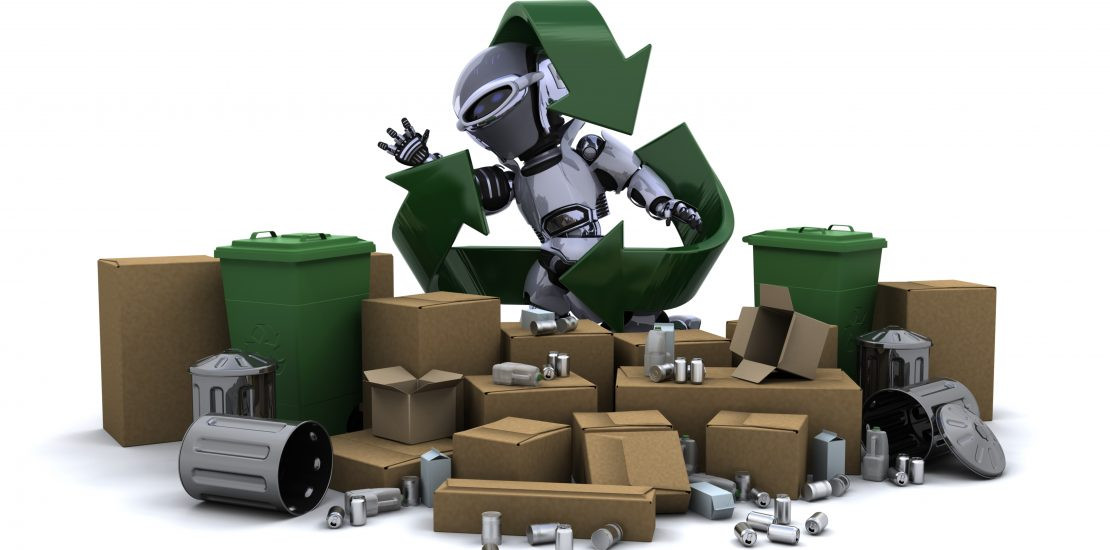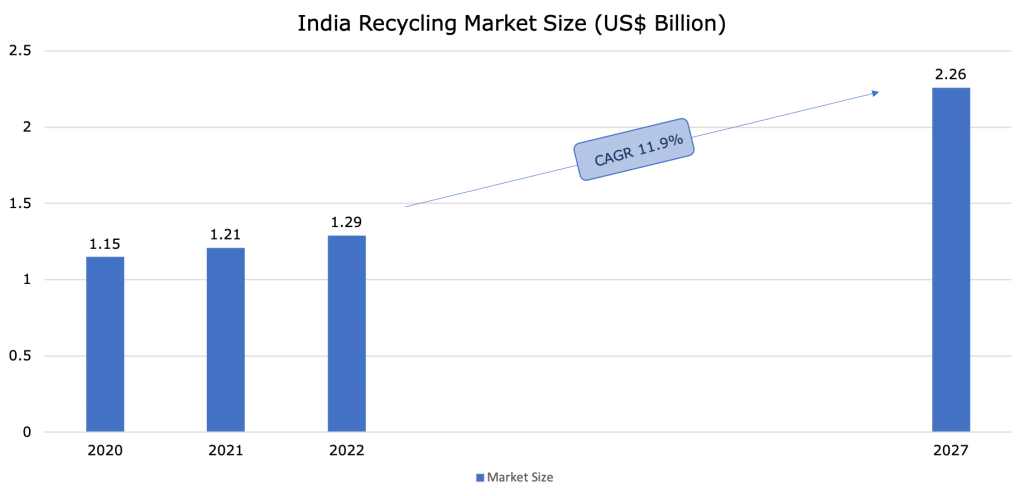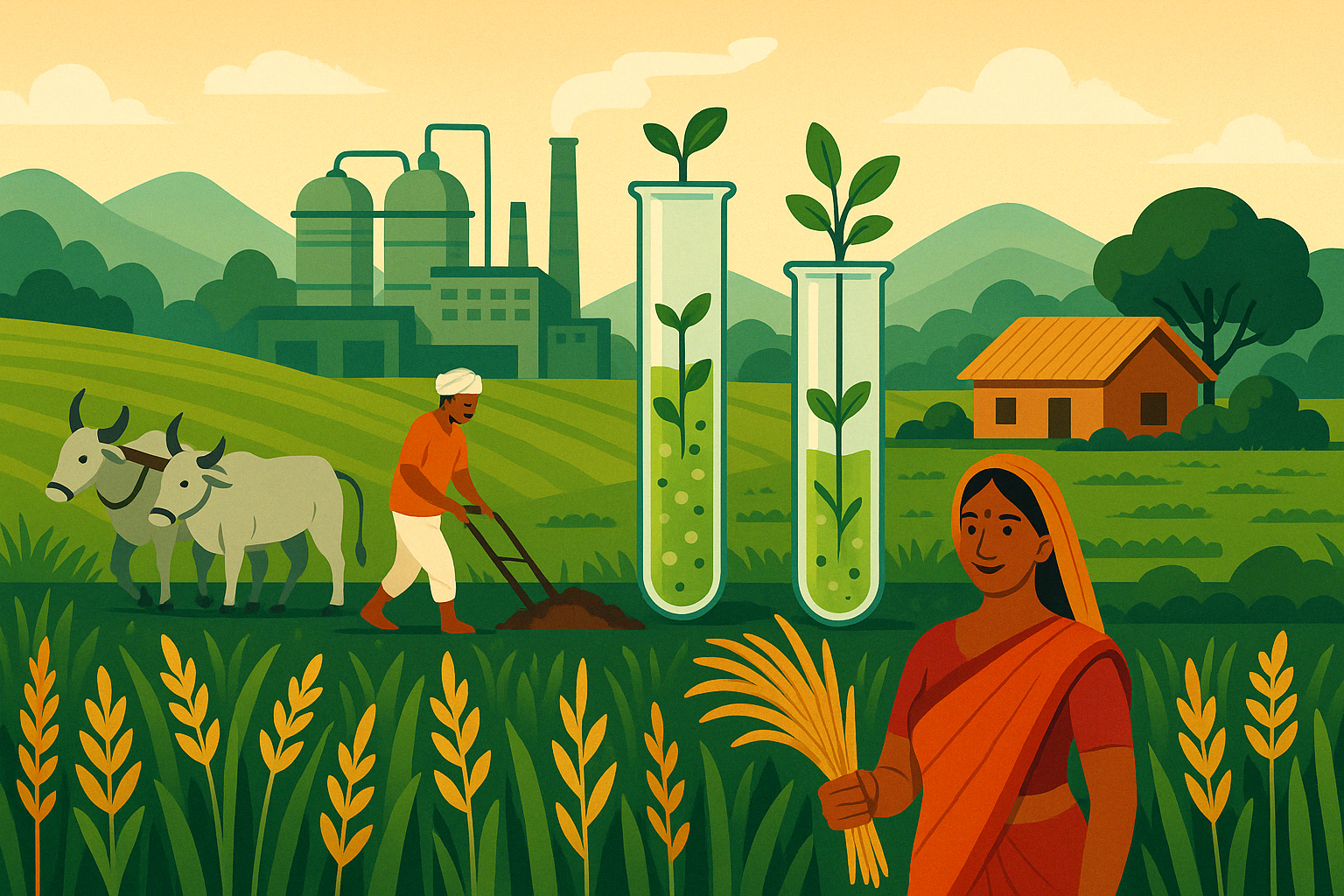An Overview:
Nowadays, waste is not considered trash or garbage; rather, they are a resource to generate a huge potential in the recycling industry worldwide. Globally, many countries have already started working towards finding the best solutions to recycle different types of waste, and India is just a little behind.
As estimated by the Ministry of Environment, Forest, and Climate Change, India generates more than 60 million tons every year. Out of it, only 20% is recycled, and the remaining ends up in landfills and oceans, affecting humans and marine life and destroying the environment. This showcases an urgent need for innovative waste management techniques and systems.
It is high time we focus on leveraging recycled products from this waste. Organisations across industries aim to reduce operational and production costs to gain profit margins. This can be achieved by minimising the cost of raw materials, which is only possible if they use recycled products instead of new raw materials every time. Using recycled raw materials, these companies can maintain quality while reducing costs. As a result, the demand for reprocessed recyclable waste is expanding exponentially in India. The existing recycling industry is divided into organised / formal and unorganised/informal sectors, out of which the unorganised or informal sector represents the higher market share. This also represents a huge opportunity for the recycling and waste management business.
It is estimated that India’s recycling and waste management industry will grow at a CAGR of almost 12% from 2022 to 2027 and will be a market of more than $2.26 billion.
Applications and Use Cases:
The recycling industry is working towards making recycling everything possible and making the planet cleaner and greener. Traditionally, recycling was focused only on a few resources, such as plastics, paper, water, and metals. However, recycling all types and forms of things around us is essential these days. Here are some of the key applications and use cases of recycling:
- Plastic Waste: Plastic has evolved into a symbol of human creativity and madness, which has created major global environmental issues. India is ranked 12th among the countries with mismanaged plastics, but it is expected that by 2025, it will be in 5th position. According to a recent study by the Federation of Indian Chambers of Commerce and Industry (FICCI) and Accenture, India is expected to lose over $133 Billion of plastic material value until 2030 due to unsustainable packaging, out of which almost 75% of the value, or $100 Billion, can be retrieved. Also, plastic recycling is done by the mostly unorganised or informal sector, which is close to 70%. So, there is a huge opportunity for the formal sectors and start-ups to provide innovative techniques to cope with India’s ever-increasing demand for plastic recycling.
- Electronic Waste / E-Waste: With the increasing use of smart devices, mobile phones, and computers, India is on the verge of generating a very high amount of e-waste in the coming years. E-waste includes precious metals, plastics, and hazardous materials. While recycling e-waste is a source of income for many people in India, it poses numerous health and environmental risks. The current e-waste disposal techniques in India have operated mostly in an informal manner due to the lack of enforcement laws and regulations. This has created a new area of economic gain for the country, especially among the urban and rural poor.
- Construction Waste: Construction is one of the biggest sectors responsible for greenhouse emissions. Concrete and cement play a bigger role here. According to the Building Material Promotion Council, India generates an estimated 150 million tonnes of construction waste annually. In contrast, the Centre for Science and Environment (CSE) estimates that only one per cent of this waste is recycled. It is possible to recycle and reuse most of this construction and bring it back to construction to lower the use of naturally sourced material. So, high demand for recycling plants can turn such waste into resources. This can help reduce energy intensity and environmental footprints of buildings and infrastructure.
- Electric Vehicle (EV) Batteries: With an increase in EV sales, one major issue will arise related to batteries – the heart of an EV. As EV sales continue to surge, so will the volumes of spent batteries. These lithium-ion batteries comprise hundreds of cells produced using valuable metals and minerals. They are toxic to the environment, so environmentalists and researchers are trying to save them from ending up in landfills. Additionally, recycling is the best option for India to cut down the imports (mainly from China) of raw materials and reuse them at the disposal of end-of-life batteries.
- Agricultural Waste: The agriculture sector in India holds the record for the second-largest agricultural land in the world. As a result, India generates about 500 million tonnes of farm waste yearly, of which half is used as fodder, and the other half is discarded. Moreover, the rice residue burning (Parali) practice in the North-Western region creates substantial air pollution and raises public health concerns. Many farmers have started using agricultural waste as bedding materials for animals, livestock feed, biogas generation, making compost and fuel for domestic and industrial use, etc. So, there is a hope that agricultural waste can be a great resource for recycling with relevant government policies and interventions of private players in waste management. Even the Ministry of Transport plans to develop flux engines for automobiles that run on biofuels from such agricultural wastes.
- Water Waste: According to World Bank data, India is the world’s biggest consumer of fresh water, with an annual consumption of 750 billion cubic meters. The Central Pollution Control Board (CPCB) estimates this demand will rise to 1.5 trillion cubic meters by 2030. India is developing rapidly but needs more awareness and infrastructure for recycling and reusing wastewater. This would result in a water crisis in the coming years. Wastewater recycling has a huge opportunity and could be a billion-dollar business in India, with proper management and collaboration of local bodies, large corporations, and innovative start-ups. Cities like Chennai have already started implementing recycling systems to avoid the wastage of used water and reduce the use of fresh water.
- Renewable Energy Waste: Renewable energy is growing faster in India than in any other major economy, with new capacity additions on track to double by 2026. India has a target of installing 280 GW of solar power by 2030. With this ambition, it is also essential to set up a target for waste management and recycling of various components, including solar panels. According to International Renewable Energy Agency (IRENA), 80 per cent of the components in solar modules are recyclable. So, it would create a huge opportunity for the recycling business in India. Though the life of solar panels is 25-30 years, the time has come to consider recycling and investing in them.
New Technologies in Recycling:
New technologies in recycling are always being developed to help increase the process’s efficiency and make it easier for people to recycle. Below is a brief about a few emerging technologies:
- Optical sorting uses sensors and lasers to sort materials by their physical properties. This can help improve the purity of recycled materials, which is important to ensure they can be used again.
- Plasma gasification uses high-temperature plasma to break down organic waste into parts. This can be used to create energy, or it can be used to create new products from waste material.
- Waste Valorisation recovers materials without quality loss or repurposes waste into new products. Start-ups are developing innovative recycling technologies to convert waste into energy and other chemicals. This generates more value than the original raw materials or products.
- Information Technology, such as artificial intelligence, the Internet of Things, big data & analytics, etc., is used widely across sectors for higher efficiency and productivity. The recycling process can also be improved using these technologies for various applications.
These are just a few examples of the many innovative technologies that are being developed to help improve recycling. As more and more people become aware of the importance of recycling, there will likely be even more advances in this area, making it easier and more efficient for everyone to do their part in saving the planet.
Our Perspective:
India is the fastest-growing country in the world, and the volume of waste is also growing. The economic output is rising too. So, there is tremendous growth in production and consumption. Most businesses aim to cut production costs by using recycled products, increasing the demand for recycling processes nationwide. India already has the required infrastructure and skills in place. However, the country needs proper channelisation of resources and relevant government policies. So, there is huge scope for start-ups and existing recycling companies to grab growth opportunities in the coming years. The recycling industry is booming, and it will stay forever. With innovations, approaches, and investments, the opportunity in this sector will grow exponentially shortly.
As the world becomes more aware of the devastating effects of climate change, companies are under increasing pressure to develop sustainable and environmentally friendly practices. Many companies are doing their part to help the environment by investing in recycling and other green initiatives. So, they also need to design industry best practices and collaborate with innovative recycling companies.







